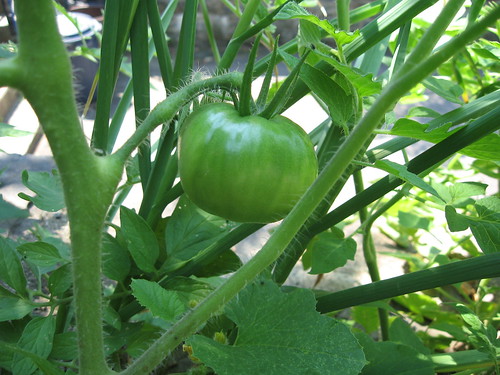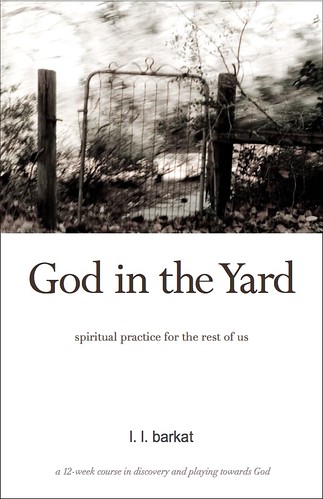Tomato Abstinence

If we can't abstain from eating a tomato out of season, why should we expect our teenagers to abstain from, well, that pre-marital "activity"?
Essentially, this is Barbara Kingsolver's question, in a chapter called "Waiting for Asparagus", in her new book Animal, Vegetable, Miracle.
Says Kingsolver, "We're raising our children on the definition of promiscuity if we feed them a casual, indiscriminate mingling of foods from every season plucked from the supermarket, ignoring how our sustenance is cheapened by wholesale desires." (p.31)
After a year of trying to eat local, Kingsolver doesn't hesitate to say such bold and bothersome things. After all, she's discovered a deeper love for food. Food at its freshest. Food at its tastiest. Food that exacts less cost on both the natural world and our bodies.
So now I'm mulling this one over. Tomatoes in December? Or abstinence 'til July? (I know, maybe I could only answer this honestly come December!)
My Green Tomato photo, by L.L. Barkat.
Seedlings Invitation: If you write a post related to this post and Link It Back Here, let me know and I'll link to yours.
RELATED:
L.L.'s local tea brew
NEW LINKS TO THIS POST:
L.L.'s Formerly Known as Delicious
Suzanne's Animal Vegetable Miracle
Labels: Animal Vegetable Miracle, Barbara Kingsolver, change, consumerism, farming, goals, temptation, waiting















32 Comments:
Oh, I am so looking forward to this book. I'm number 84 on the library wait list, so I may be longing for tomatoes in December by the time I get to read the book.
The point about waiting is so aptly made. I wait for so little in my daily life that it makes the big things I have to wait for all the harder. Physically and spiritually.
What a scandalous idea.
I had a conversation yesterday with my son, 22 yrs. old, about my generation of parents' failure in that many of us raised children from the therapeutic model---wanting them to be whole, happy, undamaged rather than raising them to do their duty, as previous generations had.
Now, the idea of raising them to respect natures boundaries ... hmmm, wonder how this will play out ... wonder if I'll still be alive to see ... wonder what will come next.
Just a few random thoughts.
Uhhh... Interesting.
I'm not sure parents are necessarily teaching their children this, just by having hot-house tomatoes in January? That's a way of life, and I'm not sure it amounts to teaching non-abstinence and self-gratification.
But I'm listening....
And I do think much can be learned through a garden and right along the lines she's talking about.
Ooh, what an interesting thought, this "taking things out of season". This book is on my list of ones to read; I enjoy Kingsolver and look forward to reading it myself.
I like how you link our demand for out-of-season produce from the supermarket (noting that this puts a strain on our planet & other resources) to our own spiritual lives.
So why wait till July for tomatoes? Why wait for said "activity" until marriage? It may be out of season, but you can have it now (this is sounding eerily like the serpent's reasoning in the garden). We want it now, even if it's flown in from Chile, even if the "activity partner" of choice isn't serious enough to make a real commitment.
So while I wait on the Lord, I will have to wait for tomatoes too?? Aw, man!! :o)
You know, I agree with Kingsolver.
When we don't wait in the little things, how can we be expected to wait in the big things? I think that's what the Lord says when He says be faithful in the small things.
This training of waiting in my children is a hard thing, though, in this modern age. It takes much thought and planning to show our children how to wait, whereas in past generations, it was almost just a way of life.
Waiting for sex till marriage isn't a black and white thing. Because there are other things to do that aren't "going all the way." But does it dilute our purity or not? Tough question. In the same way, if we wait till season for tomatoes but eat ketchup, or go to olive garden and get the roma chicken, or have a salad at O'Charley's (sp?)in December, does it make a difference? Where do we draw the line?
Still it's a great topic to think about.
Interesting concept. I never thought of it that way. Although, what if you're like me and don't know what grows when? Then what?
And while Kingsolver's idea might work well in theory, I'm not so sure it does in real life. I get her point that abstaining from certain foods until they're in season builds up self-control. But many people have complete control in one area of life, but choose not to exercise that control in others. It's not really about an inability to abstain, but rather, a conscious choice to not do so.
Wow. It is fine to talk about why she thinks it's better, or even to try ton convince us that we must abstain from eating foods out of season. I am not sure exactly how extreme a position Kingsolver takes, and I would be willing to hear about it. But doesn't it seem like an unreasonable stretch to put all forms of abstinence on an equal plane?
Can you teach moral purity by starting with lessons from the tomato? Sure. But if we don't wait for tomatos, can we still expect people to wait until matrimony? You betcha!
Er... tomatoes, not tomatos. Sorry.
We do this in small part in my family, just out of economic necessity. I refuse to pay the high prices at the supermarket when vegetables or fruits aren't in season.
But waiting isn't always a chore. When it becomes "anticipation", then it's a joy. We are so totally anticipating our annual camping trip to Michigan where we go blueberry picking! Nothing like eating them straight off the vine (of course we're still eating the ones I froze in December, so... well, they're frozen not fresh and therein is the treat in waiting).
My two cents for today. :)
Oops - I really do pick blueberries, but not off the vine. Off the bush. Or bushes. Lots of them.
Charity... perhaps it's fitting that you must also wait for the book? :) I've been musing on the question of whether there are really "big" and "little" things... in other words, I wonder if the more important aspect is the attitude with which we come to things (making, therefore, everything bigger than we might at first suppose). If so, then the task of waiting for tomatoes or waiting for physical involvement are one and the same.
Christine... am I hearing you say that respecting nature's boundaries is a duty? Or am I misinterpreting?
Ted... you make an apt point... if we are ignorant that we are violating some deep seasonal and spiritual reality by eating this way, perhaps we are not truly being cuisine promiscuous. Now, I wonder if anyone would be willing to apply the same kind of logic to the act of physical promiscuity?
Kirsten... your mention of things being out of season, the way you said it, really struck me... it is the idea that something is not necessarily intrinsically off-limits (and I go back to a question I asked Craver long ago... was the forbidden fruit something they NEVER should have taken? Could there conceivably been a time when it might have been okay to do so?)
Andrea... yes, as I am reading Kingsolver I'm suddenly feeling this is linked to much larger questions of a total way of life. And this makes it both appealing and disturbing (in the sense that it requires new ways of thinking, new discoveries, new commitments).
The Cob... I agree. I am definitely thinking about line-drawing as a part of this. How far do I need to go (or not go) to be living a life that is healthy for me, for my neighbors and community, for the world? Maybe this is a question that takes time not only to answer but also to grow into in terms of practice. Makes me think of Lauren Winner's discussion of chastity being a spiritual discipline she had to learn to practice over time.
Inihtar... of course Kingsolver doesn't use this as a major argument... I just picked it up because I thought it was very thought provoking. Indeed, she recognizes the limitations and that people will have learning curves. I think one simple way to begin is to use A Musing Mom's technique... if the price is high, there's a reason... we're paying for shipping costs over thousands of miles. So we can always go for the cheaper veggies. I think that look, feel, and fragrance also tell a story, if we slow down for a moment to hear it in the aisle.
Craver... all spellings of tomato are allowed. :) Kingsolver is not extreme (not to my mind anyway). She's not asking everyone to do a total about-face. For instance, her husband offers this advice in a side-bar...
"A quick way to improve food-related fuel economy would be to buy a quart of motor oil and drink it. More palatable options are available. If every U.S. citizen ate just one meal a week...composed of locally and organically raised meats and produce, we would reduce the country's oil consumption by over 1.1 million barrels of oil every week. That's not gallons, but barrels. Small changes in buying habits can make big differences." (p.5, Steven Hopp)
A Musing... I like the idea of focusing on anticipation... waiting for the right season, with all the attendant pleasures.
I have three younger sisters. Of the four of us:
-I can put up with tomatoes.
-The next two sisters down hate tomatoes and won't eat them.
-The last one loves tomatoes, but she's naturally happy; she likes everything. She's been able to 'wait until tomorrow' since she was two. Unbelievable.
All of which is just to say that it would be difficult to make not having tomatoes a great sacrifice in this house :-) I realise that's not really the point, but . . .
Christine, perhaps we could consider virtue and the ability to seek it to be a part of being whole? Because I think the "whole, happy, undamaged" model includes some important stuff. Maybe it could be modified to include duty, if you think it doesn't already.
You will note that, despite not believing chastity to be a virtue of itself (though self-control is), I still have not abstained from this conversation. Lack of practice? (Actually, I don't think I do lack practice in abstinence generally, but never mind).
The whole buy locally thing is interesting to me. I heard just the intro to a discussion on NPR last evening where they were positing that the environmental cost of vegetables shipped from California to New England by the pallet-load (or greater) might be lower than the cost to the environment of those same vegetables usually trucked in smaller amounts from across town. It sounded intriguing, but I had to get out of the car and missed the rest. Did anyone else happen to catch that? I'm wondering what the deal was.
Hmmm. I like to eat locally as much as possible because it tastes better. And we're pretty poor, so we get nearly all our produce when its in season. It's cheaper.
The promiscuity argument seems like a good shocking metaphor, but not a particularly good logical argument.
Lynet... still, I like hearing about your tomato realities. And, on the chastity thing... why don't you consider it a virtue, while you actually view self-control as a virtue? Or maybe it is better asked this way... how might we define virtue?
A Musing... yes, I wonder how that fits with the sidebar info I put in the previous comment, about saving 1.1 million barrels of oil a week by buying local? I find some of the other reasons to buy local quite intriguing. It's making me reconsider (more) how I deal with food here.
Mark... tell me more. What is it about the metaphor that seems illogical?
L.L. I wasn't saying respecting nature's boundaries is a duty. I was comparing generational parenting models ... and contemplating the one described here as a holistic one.
However, respecting nature's boundaries is good stewardship. Duty? Not sure that allows for enough liberty and flexibility.
Suzanne... oops! Missed you. Thanks for the heads up. I tried to comment on your blog but for some reason couldn't get the comment box to appear. Sorry!
Christine... hmmm... I guess I must have missed the connection between my post and your thoughts. (Not an unusual phenomenon for me to miss connections!)
L.L.---it is entirely possible that the miscommunication originates from the other side of the dialogue!
I see changes in the way Christians are thinking and talking about parenting, and that change is reflected in this author's work.
I don't wish to shock your readers, LL, but part of the reason I wouldn't call chastity a virtue is because I don't agree with the opinions on the allowability of sex that usually go with it. There are perhaps versions I could endorse. I could come up with ground rules:
- Don't have sex if you don't want to.
- Don't have sex with someone who you're fairly sure will regret it.
- While in a sexual relationship, do your best to keep your intentions clear.
- Don't use sex as a means to control people, or to hurt people, or to make yourself seem more attractive.
- etc, etc, etc
But there is no rule, in my book, that says "Don't have too much sex." Nor is there a (hard-and-fast) rule that says "Don't have sex with too many people." (Although there is definitely a rule about trying not to spread STDs, which involves condoms and might involve a suggestion -- only a suggestion -- to limit number of sexual partners).
If I wanted to sum up a "chastity" rule, I suppose I could say something like "Don't allow desire for sex to stop you from caring for the physical and mental health of yourself and others (and any potential children!)." But that's not what chastity usually means.
My neighbors have brought me homegrown tomatoes, and they are the best I've ever had, so I completely see your analogy.
But do I really have to give up my Dec tomatoes?
Ooh ... looks like some lively discussion has been going on here since I last stopped by!! Many interesting points of view.
You pose an interesting question, LL: "was the forbidden fruit something they NEVER should have taken? Could there conceivably been a time when it might have been okay to do so?" I never thought to ask that before, but now I'm wondering IF there could have been a time when God would allow A & E to partake of that particular tree. Only God knows for sure, but I think maybe the answer is yes.
What about the tree was it that made it forbidden, I wonder? Did God just choose a tree because something in the garden needed to be forbidden, or was it something that was good, but that there was an appropriate time & place to enjoy when He gave his go-ahead to do so? Since God created it, it couldn’t be inherently bad, or evil, could it?
Like sex isn't intrinsically evil (I think most people are glad God thought of that one), but there are appropriate boundaries within which a couple may enjoy it (I am so convicted); outside those boundaries, it becomes something that may harm or maim not only our bodies, but our souls.
Building on that principle, if we petition God for something we want and don't receive it (or don't receive it in the timing we would like), what if we try to go out and seize it for ourselves, much like Jacob scheming his way into the Promised Land? Isn't taking something out of season (even if it is not intrinsically bad) -- in a time other than God has given us permission to do so -- bad? It seems to me that it displays a lack of trust in His provision (not that I am any expert where this is concerned).
All through the Bible, we hear phrases like "In the fullness of time", "wait on the Lord", etc. There seems to be a definite current throughout Scripture, not of waiting for the right time as we define it for ourselves, but specifically of waiting for God's timing.
Now back to those tomatoes ... while it may not be a serious moral issue to enjoy fresh produce out of its natural season, it does have implications on economy, community, environmental health, etc. beyond just me being able to enjoy those fruits in December (I was shocked by the statistic of how many barrels of oil could be conserved simply by buying local food for one meal per week!!). In some way, I think it hearkens back to "he who is faithful in little will be faithful in much".
I feel like I'm rambling, I'll stop now!! :o)
Kirsten, I found your thoughts very refreshing and also nothing like a ramble. And even if it was a ramble, I like a ramble from time to time. Just one person's perspective. :)
The questions about the tree in the garden are really interesting to me, too. It was the tree of the knowledge of good and evil, right? I wonder at what point God would have ever allowed Adam and Eve to eat of it . . . perhaps they, too, were meant to grow?
Ooh, ooh! This makes me think of a conversation I had with a good friend about the nature of growth and how that might apply to heaven. When God created the garden, He created man to tend it. This means it was created with the capacity to GROW, and man's first mission was to monitor that growth so that it grew in a "good" direction, akin to its nature.
In the same way, we as humans grow . . . and not just physically, but emotionally and mentally and spiritually, etc. God sees this as good, since He created us with the capacity to do so, right? He set up our bodies and minds that way, and His word clearly speaks of our need to grow in knowledge and grace.
I wonder, then, if there will be growth in heaven. Like, we won't get to heaven and be zapped with all knowledge of all things. Maybe even relationships will continue to grow in heaven. We're going to reign and rule over certain domains . . . sounds somewhat similar to the garden directive, doesn't it?
Now I think I'VE taken us off on a sufficient ramble . . . !
Lynet... Thanks for your sensitivity about my readers. I do think that some of your sex guidelines fit right in with a Christian perspective (especially in practice, if not in theory... Lauren Winner's book Real Sex has a good discussion of statistics and attitudes).
I also think that regret is hard to predict in the long term. I've known people who've done the many partners thing quite happily, then they've gotten married and wished they'd never filled their flesh and their memories with others who come back in the mind's eye to compete or diminish.
Heather... it's about taste, yes. But it's about so much more too. Kingsolver does a good job (if sometimes maybe too sarcastic or cynical) of discussing the myriad issues that surround a December tomato.
Kirsten... I like your reference to the fullness of time. Jesus seemed to base a good portion of his life on that mindset. And I think your connection of the fullness of time to waiting on the Lord probably has some very important implications.
Christianne... which brings up some interesting questions about the nature of growth. What does it mean to grow? What would it mean for me to grow in my perspectives on food (the, I have to remind myself, topic of this post... you know, I love how the topic of a post rambles its way into other topics that have urgency for people's lives and emotions.)
I love this thought! Now if I could only get a garden started. I've been gardening a long time, but with a move away and then back, life is pretty stressful.
Living in France, eating from the local markets, I have a high appreciation for fresh produce.
Also, let's remember we can take those amazing tomatoes and can them!
What if...?
What if, by eating a hothouse tomato in December, I'm reminded of God's grace bestowed upon me?
That, though I was not perfect, was not "ripe" for His kingdom, it was certainly not "the fullness of time" for my completion, He nurtured me against the tide of natural elements (my flesh, this fallen world), then picked me and enjoyed me when I was "out of season."
I think a tomato in December can be a wonderful metaphor for all kinds of things.
My own tomato plants are about to yield a bumper crop. The kids and I counted 60 so far. Come August, I'm going to be knocking on your door with a wagon load of yummy sun-ripeness. :)
Hi LL! I haven't been by for a while, but just posted something in a very similar vein (having to do with the battle of the flesh and the spirit and ultimately, fasting). Peace to you! Kim
I'm for tomatoes and other fruits year-round, for it seems to me that if you were actually able to count the improvement that this would make in human health, it would greatly outweigh the damage reported to the enviroment in terms of fuel utilization.
I would rather suggest that finding a way to do the transport so that the whole body (world) shared the bounty of each individual body part's "season" would be a better way to address the issue.
Food is simply for the body and though can certainly be used inappropriately, I fail to see how it can be used as a moral analogy, much less one for promiscuity.
Perhaps I'll have to sign up after Charity on the library list!
Relevantgirl... I suppose the idea is to begin where we can. This last winter I did try to buy more seasonal vegetables. It was amazing what I learned to do with a carrot, a cabbage, a winter squash in everything from raw to cooked salads and soups and stir frys. Here's wishing you a homegrown tomato soon!
Erin... ah, yes, the hothouse. Not always a comfy place with its humidity and high temperatures... and that might apply to how grace molds us, yes? I'm counting on your gift of tomatoes too!
Kim... welcome back. Good to hear your voice! And it's amazing how these things are put into perspective when we do occasionally take the time to fast. It reminds us that we can indeed live within limits, even thrive because of them in the longrun.
Halfmom... yes, you raise a good point. The issue of human health. This leads us to other questions, such as... what is human health in its various dimensions, what are the factors that go into supporting or diminishing such health, and is human health a separate entity from the health of the human landscape (ie. the Created world)? And it could be fun to try to answer these questions in the context of the local or not-to-local consideration.
What an interesting thought! Hmmmm. I've seen this book around, and might have to give it a look. But at the expense of tomatoes, which is one vegetable (fruit?) that my son will eat year-round?? Not sure about that. . . .
Laura, I think your invitation to play in the playroom facilitates that rambling nature . . . which, I think, makes it fun. You never know what kind of connections will be made -- like your connection to growth on perspectives of food. It looks like you've already been growing right along. You're further along now than you were when you started out. You've even got a separate blog about it! :) We read and we talk with others and we try things and we keep educating ourselves and letting that interact with our daily actions . . . and slowly we grow along.
Interesting. The metaphor you describes seems to push itself a little too far.
Post a Comment
<< Home